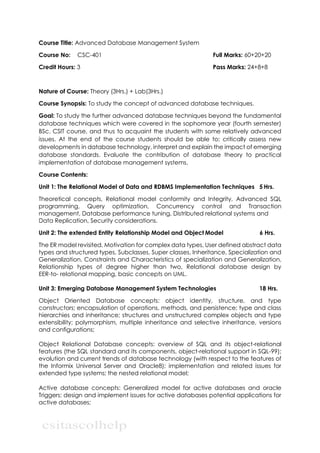
Advanced Database Management Course
- 1. Course Title: Advanced Database Management System Course No: CSC-401 Full Marks: 60+20+20 Credit Hours: 3 Pass Marks: 24+8+8 Nature of Course: Theory (3Hrs.) + Lab(3Hrs.) Course Synopsis: To study the concept of advanced database techniques. Goal: To study the further advanced database techniques beyond the fundamental database techniques which were covered in the sophomore year (fourth semester) BSc. CSIT course, and thus to acquaint the students with some relatively advanced issues. At the end of the course students should be able to: critically assess new developments in database technology, interpret and explain the impact of emerging database standards. Evaluate the contribution of database theory to practical implementation of database management systems. Course Contents: Unit 1: The Relational Model of Data and RDBMS Implementation Techniques 5 Hrs. Theoretical concepts, Relational model conformity and Integrity, Advanced SQL programming, Query optimization, Concurrency control and Transaction management, Database performance tuning, Distributed relational systems and Data Replication, Security considerations. Unit 2: The extended Entity Relationship Model and Object Model 6 Hrs. The ER model revisited, Motivation for complex data types, User defined abstract data types and structured types, Subclasses, Super classes, Inheritance, Specialization and Generalization, Constraints and Characteristics of specialization and Generalization, Relationship types of degree higher than two, Relational database design by EER-to- relational mapping, basic concepts on UML. Unit 3: Emerging Database Management System Technologies 18 Hrs. Object Oriented Database concepts: object identity, structure, and type constructors; encapsulation of operations, methods, and persistence; type and class hierarchies and inheritance; structures and unstructured complex objects and type extensibility; polymorphism, multiple inheritance and selective inheritance, versions and configurations; Object Relational Database concepts: overview of SQL and its object-relational features (the SQL standard and its components, object-relational support in SQL-99); evolution and current trends of database technology (with respect to the features of the Informix Universal Server and Oracle8); implementation and related issues for extended type systems; the nested relational model; Active database concepts: Generalized model for active databases and oracle Triggers; design and implement issues for active databases potential applications for active databases;
- 2. Temporal database concepts: Time representation, calendars, and time dimensions; incorporating time in relational databases using tuple versioning, incorporating time in object-oriented databases using attribute versioning, time series data; Multimedia Databases: The nature of multimedia data and applications; spatial database concepts and architecture, introduction to multimedia database concepts; Deductive databases and Query processing: Prolog/Datalog notations, clausal form and horn clauses; interpretations of rules; Mobile Databases: Mobile computing architecture, characteristics of mobile environments, data management issues; Geographic Information Systems: GIS applications, data management requirements of GIS, specific GIS data operations. Unit 4: New Database Applications and Environments 8 Hrs. Data Mining: Overview of data mining technology (associated rules, classification, clustering), applications of data mining; Data Warehousing: Overview of data warehousing, typical functionality of a data warehouse; Unit 5: Database Related Standards 8 Hrs. SQL standards, SQL 1999, SQL 2003, Object Data Management Group (ODMG) version 3.0 standards (ODL, OQL), Standards for interoperability and integration e.g. Web Services, SOAP, XML related specifications, e.g. XML Documents, DTD, XML Schema, X-Query, X- Path. Laboratory Projects: The course involves a mini project using any one of the popular Commercial Object-Oriented DBMS software such as Oracle, MS SQL Server etc., along with any MVC software development framework. Prerequisite: Be familiar with at least one OO Programming language such as .Net or C++ or Java, Fundamentals of DBMS, SQL. Reference Books: Elmasri and Navathe, Fundamentals of Database Systems, Pearson Education Raghu Ramakrishnan, Johannes Gehrke, Database Management Systems, McGraw-Hill Korth, Silberchatz, Sudarshan, Database Systems, Design, Implementation and Management, Thomson Learning C.J. Date & Longman, Introduction to Database Systems, Pearson Education Computer Usage: Windows or Linux based PC or workstation, Commercial OODBMS software package and MVC software development framework installed at the server. Category Content: Science Aspects: 60 % and Design Aspects: 40 %